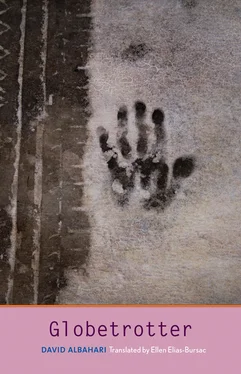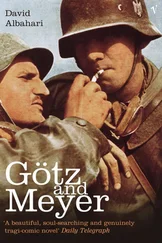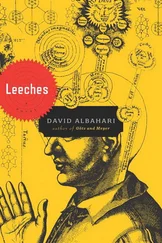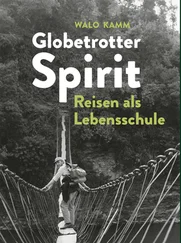The grief was still there on the grandson’s face, but by then, if I can put it this way, his was only half the grief: the other half had sidled over onto Daniel Atijas’s face. And while the grandson’s face slowly began showing a softness I had seen no trace of earlier, Daniel Atijas’s face, at least for that evening and night, looked less and less like the face I had been drawing and because of which I was sitting where, by all accounts, I should not have been. The next day during breakfast I tried to explain this to Daniel Atijas through the haze of his and my hangovers, but my mouth was dry, the words stuck to one another, and I had to give up before I’d properly begun. Daniel Atijas kept shaking his head, stopping only long enough to sip his coffee. We held our coffee cups like drowning men clinging to life belts. He had thought, said Daniel Atijas finally, that he would not be able to fall asleep last night at all, but as soon he dropped his head onto his pillow, he sank into a deep, though unfortunately not refreshing, sleep, which was probably, he said, obvious, and me? he said, asking how long I had slept. I said that, unlike him, I had dropped off to sleep while my face was still in the air above the pillow and that I had slept, if my arithmetic wasn’t off, at least four, maybe five hours. I don’t know why I had to lie and why I didn’t admit that I had slept on the floor next to the bed and that when I woke, I couldn’t get back to sleep afterward, in part because of what all of us, and particularly Daniel Atijas and Ivan Matulić’s grandson, had talked about, and because of my fear that Daniel Atijas’s face wouldn’t go back to being the way it had been before, but also because of everything that had been playing out inside me, about which, even if I’d wanted to, I couldn’t have spoken.
I woke up at four; the sky by then was starting to fill with light, and soon the light was so bright that I could no longer squint it out, so I got up and watched the morning turn into the world. Excess is never a good thing, said Daniel Atijas, regardless of whether it was excess of drink, food, music, or whatever else. Last night, for instance, he said, we gorged ourselves on words, and if we had vomited later, if we could have, out of us would have gushed half-chewed, gnawed words, jumbled sentences, the occasional punctuation mark. Both of us raised our hands high — he his left, me my right — to flag down the waiter and his jug of coffee. At noon we were supposed to meet again with Ivan Matulić’s grandson; instead of going back to Calgary he had gone to spend the night at a cousin’s in Canmore about twelve miles from Banff; at the very thought of the words we’d be saying then, though most of them would belong to Daniel Atijas and the grandson, I began feeling queasy, though, like every addict, I could hardly wait to feel that way. The waiter finally came over, poured coffee into the cups shaking in our hands, tsk-tsked, and promised he’d be back again soon whether we hailed him or not. Daniel Atijas’s face was once again the face I had seen on the small poster by the reception desk. True, tiredness had left its mark, his eyes had shrunk, the corners of his lips were loose, but all that, I was convinced, was transitory, and none of it alarmed me. What did alarm me was something I sensed more than saw, something which still had no definite shape, nor was it attached to any particular part of his face, something which, at least for the moment, I would not have been able to draw but which kept slipping, shadowlike, over his features, his brow and the bridge of his nose, threatening, at some point, to stop and stay, I feared, for good.
It was not, to be frank, the shadow itself I feared, its density or its reach; what worried me was that in it I saw only a beginning, an intimation of events that had been set in motion and could no longer, as in a Greek or Shakespearean tragedy, be recalled. I am a child of the plains and don’t know much about avalanches, but while we were sitting that morning in the dining hall of the Centre in Banff waiting for the waiter to bring fresh coffee I could not suppress the thought that we were in the path of an avalanche from which, no matter what we did, we would not escape. I didn’t even try to explain this to Daniel Atijas, and had I tried, I wouldn’t have gotten it right, but even if I had gotten it right, he wouldn’t have believed me — this I know. I later wrote on the back of a drawing that it was interesting that I felt no jealousy at all, which was unusual, since Ivan Matulić’s grandson attracted Daniel Atijas in a way that I had not; something had sprung up between them that I could not touch, a rapport they shared through their background, even though Ivan Matulić’s grandson, as he had told us the previous evening, was born in Canada, whereas Daniel Atijas was a Jew, an outsider, essentially, in the place where the grandson’s ancestors were from. In that sense, “background” is the wrong word, but better that word than none at all, though I doubt that Daniel Atijas, as a writer, would agree. Whatever the case, they had spent yesterday and last night growing closer and closer, not along a straight, one-way trajectory, but rather along one full of small retreats and advances, as if they were playing chess on an invisible board with invisible pieces.
At first, of course, it looked as if they wouldn’t even shake hands, let alone sit at the same table, and I even thought, watching the restraint with which the grandson greeted Daniel Atijas, that this was all wrong and that the grandson — and I was prepared to bet on it at the time — would soon be on his way. I reckoned that Guy Fletcher must have told him something, who knows what, for nothing else could have explained the grandson’s reticence. The next morning while we were at breakfast, actually while we were holding our cups of coffee, Daniel Atijas explained that coffee drinking was a ritual that now marked, without fail, every encounter between people from his former country, especially if they were in enemy camps, regardless of whether the person was someone who actually lived there, such as Daniel Atijas himself, or a descendant, such as Ivan Matulić’s grandson. All this, said Daniel Atijas, flagging down the waiter, is inevitable, and understandably inevitable at that, he said, for time is remembered, in the words of a poet, as a series of segments strung between wars, as a series of time markers — before, after, during the war — and therefore those who share war, he said, feel greater affinity than those who share peace. And greater distrust, he added a little later, when I’d already assumed he would not be speaking again, for he, he said, was from Belgrade, the capital of Serbia, and Ivan Matulić was from Zagreb, the capital of Croatia, and, he said, the greater part of the war went on in a conflict between Serbs and Croats, from which neither of them, though one was a Canadian and the other a Jew, could escape.
Short on sleep and long on caffeine, I could accept that explanation calmly, but the previous evening I had not hidden my surprise and dismay. Ivan Matulić’s grandson had shown, of course, typical western-Canadian politeness, but this was only a façade. I believe that Daniel Atijas could feel it too, but he never, not even for a moment, betrayed himself. He walked to the grandson’s right and I to the grandson’s left, and spoke as if the existence of the world depended on what he would say. They spoke in English, though not so much for my sake as for the sake of the grandson, for his Croatian, he said, had been reduced to everyday niceties, stock phrases, and, of course, swear words. That is how it started: with a story about language. We had strolled around the streets of Banff talking about language and the identity problems of first- and second-generation immigrants, along the way settling on where we might go for dinner. Daniel Atijas mentioned local specialties, Ivan Matulić’s grandson was all for Ukrainian, I was up for sushi. In the end we went to The Coyote’s Den. The grandson had grown gentler by then; his face was fuller, his answers longer, and his questions less frequent. From that moment until about midnight he addressed me more often than he did Daniel Atijas because he was talking about things that I, he believed, could understand. And I did. All of us in Canada, after all, were immigrants, some earlier and some later, with only a handful of people, five-six hundred thousand Indians, who could claim to have come from here, who really belonged to country and clime, so the story of Ivan Matulić’s grandson, the first part of his story, actually, was very familiar.
Читать дальше







![David Jagusson - Fesselspiele mit Meister David [Hardcore BDSM]](/books/486693/david-jagusson-fesselspiele-mit-meister-david-har-thumb.webp)




